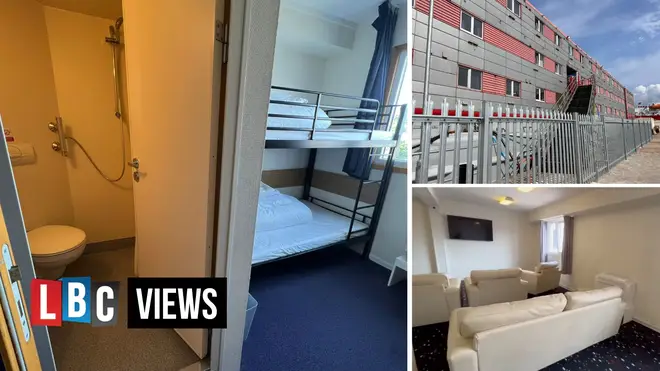
Matt Frei 10am - 12pm
21 July 2023, 15:28 | Updated: 21 July 2023, 16:03

It's a cross between European budget hostels and basic student accommodation. Walking around the barge which is about to become home to 500 asylum seekers earlier today, I felt a sense of déjà vu.
The vast majority of the Bibby Stockholm's rooms sleep two people in standard metal bunkbeds, with a small cupboard converted into an en-suite shower room. There are also 20 bedrooms that will sleep four and two rooms of six - although I wasn't permitted to view those.
The 93-metre long vessel is still undergoing a refit to turn it into suitable accommodation for hundreds of single male asylum seekers - including installing CCTV in every communal area and hallway.
What struck me most was the televisions.
There is a small one in every bedroom on the barge, but none of them work for their primary purpose. I'm led to understand all the televisions were present before the government commissioned the Bibby Stockholm, and it was at the Home Office's request that these be disabled.
The owners are leaving each TV in the rooms, telling me they would cost too much to remove, so asylum seekers will be allowed to plug in another device like a phone and use them as larger screens.
I was expecting the barge to feel cramped inside and, by counting around six footsteps across the bedrooms, I wasn't wrong. The hallways are long and narrow, and won't take long to block up when hundreds of people are living on board.
What I didn't expect was an outdoor courtyard in the middle of the vessel which will host activities like basketball, netball, volleyball and football.
There's a gym, a multi-faith room, a conference room and dedicated NHS clinical area. It will be run by an advanced nurse practitioner five days a week, treating around 24 patients each day and referring any who need to be seen by a doctor to a GP from South Coast Medical.
The dining area was another surprise.
It's a large buffet-style canteen run by a catering staff of 28 (most of whom speak multiple languages and are trained in cultural sensitivity). Menus will be posted on the wall each day and there will be a 24 hour station for tea, coffee and soup.
Every asylum seeker on board will live there for between three and nine months, according to the Home Office. In that time, they will be offered four English lessons a week as well as day trips with Dorset Council to do things like hiking, visiting local farms and community events.
For one hour walking around, the Bibby Stockholm felt comfortable enough. But for 500 men living aboard 24/7, that on-land time might be a relief if only to be in an open space.
The first 50 asylum seekers are scheduled move in next week and, from everything I have seen and heard, the Home Office is determined to work out any flaws in the system quickly so it can move ahead with plans for more barge accommodation across the UK.